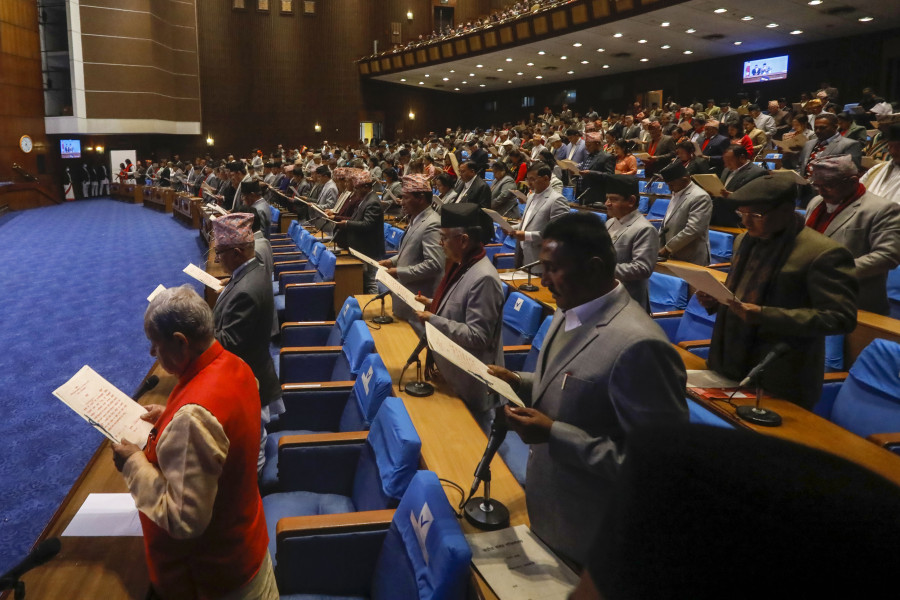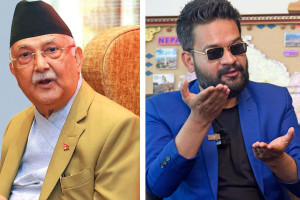Columns
Gobbledegook in parliamentary debates
Use of indecent language can do much damage to our hard-earned democratic system.
Abhi Subedi
The pattern of the ongoing parliamentary debates has struck me as a linguistic phenomenon. As a student of linguistics, especially of its pragmatic orientation, I am naturally drawn by the nature of the parlance used in Parliament. The linguistic side of such interactions has occupied the minds of people who watch the news and read the newspapers. The parliamentarians' choice of language and their frequent violations of the rules of interaction evoke some questions that are linguistic in nature.
My interest in Parliament emanates from the average concern of a citizen in the events happening in the land. One important aspect of pragmatics is that interlocutors should come together to perform various speech acts that are realistic and functional. Doing communication effectively, not just in the use of metalanguage but also in ordinary exchanges, is the act of pragmatics. The mantra of such communication is the participation of interlocutors who need to follow certain rules of interaction. In modern times, parliaments are the best spaces to see that being exercised. The reasons are obvious.
Parliament is designed, created and even invented by political groups for exchanging ideas and drawing conclusions. Such conclusions are supposed to help the government. That means the results of such interactions are shaped by a sense of pragmatics. Parliaments are such pragmatic spaces. The ancient Greeks were remarkable on that score. They understood the role of pragmatic linguistics when they created a forum to discuss various topics of importance and interest for the state. Such meeting places were called agora. It is moving to see the non-descript space below the Acropolis of Athens in Greece that reminds visitors of this tradition. Parliament may be considered to be the continuation of the spirit of agora.
In today's world, some parliaments are mere shows or façades to give the impression that the concerned system of the country is functioning democratically. They are controlled by dictatorial regimes or the elite who hold the real power. Sometimes, we see anomalies occurring in the parliamentary system of countries that we consider to be democratic. Interference of power groups and bullies are common sights today.
On some occasions, things go too far resulting in the legislators themselves passing resolutions to behave properly in Parliament. One case of the British Parliament about which I read in The Guardian (September 30, 2019) can be cited here. All Westminster parties sign a pledge to use “moderate language” with this resolution, “We all accept that we have a responsibility to try to use moderate language." The statement says, “We all feel that those in leadership positions have a particular duty to weigh their words carefully, bearing in mind that there are stark divisions across the country on Brexit."
Some attempts have been made by some Members of Parliament (MP) towards decency in the Nepali Parliament too. Professor Lok Raj Baral cites these examples of an MP drawing attention to the breach of a simple norm in the speeches of some representatives, and the president of the Rastriya Swatantra Party calling upon its members to refrain from making such mistakes, and to apologise if such transgressions occur in their speeches. (Kantipur, June 14, 2023). The kind of language used by MPs in Parliament, we must say, is not so uncommon in parliamentary debates. But we seem to be breaching norms these days. Sometimes, I cringe at the language used by our MPs in Parliament.
Reckless and undignified
Perhaps little do we realise that the reckless and undignified or amaryadit use of language by MPs happens especially when they are exhibiting the pain that comes from their need to suppress a sense of failure, or what philosopher Bertrand Russell called a lust for power. In other words, we should realise that whenever we breach the norms of decency, we are being haunted by spectres of failed political systems and the dreams of some leaders who come from diverse political streams. When they speak, one thing is certain: They do not have the same thing to say. But they also could be united by the above frustration and pain. It is very good for diverse groups of people to come together in the democratically elected Parliament. But it requires a lot of restraint and educated efforts to make the parliamentary system effective.
We must realise that linguistic devices are used by democratic systems to preach the mantra of openness and decency, pragmatism and democratic culture of multiple opinions. It also brings up another question: Then what do we want to do by using gobbledegook in parliamentary debates? In Nepal, very diverse political groups have come together under the power of some covenant. I consider that a great democratic achievement. There is an atmosphere of freedom and decent flow of ideas in Nepal now. But that sense of telling something important and urgent in a free atmosphere can go totally wrong if we are not careful. Use of indecent language can do much damage to our hard-earned democratic system. Fortunately, there are always ways to find points of weaknesses and correct them. That comes from a cool recognition of our linguistic usage in our performances.




 10.12°C Kathmandu
10.12°C Kathmandu















